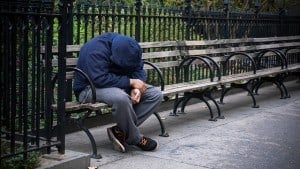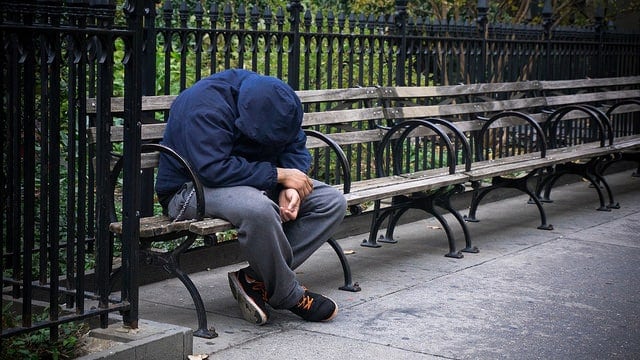
Resting Runner, Homeless Man, or Addict? | Flickr user Zeldman | Flickr Creative Commons
A few of my friends have been sharing an article from The Huffington Post entitled “The Likely Cause of Addiction Has Been Discovered, and It Is Not What You Think.” The author, Johann Hari, shares information he has gathered about the global war on drugs and the effects of those efforts.
His book and this article in particular debunk two widely-accepted ideas about drugs and addiction: [1] addictions are mere chemical phenomena and [2] isolation is the best way to treat addicts.
Feel free to peruse the article – many will disagree with Hari. However, his points are logical, factual, and thought-provoking. If nothing else, his hypothesis offers a more holistic approach to treatment than merely treating chemical dependency.
Some quotes from the article:
On an experiment involving rats in isolation versus community:
The rat is put in the cage all alone. It has nothing to do but take the drugs. What would happen, he wondered, if we tried this differently?… The rats with good lives didn’t like the drugged water. They mostly shunned it, consuming less than a quarter of the drugs the isolated rats used. None of them died. While all the rats who were alone and unhappy became heavy users, none of the rats who had a happy environment did.
On an interesting human parallel to the rat experiment:
Time magazine reported using heroin was “as common as chewing gum” among U.S. soldiers, and there is solid evidence to back this up: some 20 percent of U.S. soldiers had become addicted to heroin [while serving in Vietnam], according to a study published in the Archives of General Psychiatry… But in fact some 95 percent of the addicted soldiers — according to the same study — simply stopped [using heroin]. Very few had rehab. They shifted from a terrifying cage back to a pleasant one, so didn’t want the drug any more.
On a failed chemical experiment to cure addiction:
So when nicotine patches were developed in the early 1990s, there was a huge surge of optimism — cigarette smokers could get all of their chemical hooks, without the other filthy (and deadly) effects of cigarette smoking. They would be freed. But the Office of the Surgeon General has found that just 17.7 percent of cigarette smokers are able to stop using nicotine patches.
On Portugal’s efforts to help addicts reclaim their relationships with themselves and society:
[Portugal] resolved to decriminalize all drugs, and transfer all the money they used to spend on arresting and jailing drug addicts, and spend it instead on reconnecting them — to their own feelings, and to the wider society. The most crucial step is to get them secure housing, and subsidized jobs so they have a purpose in life, and something to get out of bed for.
All of this reminds me of Greg Boyle, SJ’s credo of kinship.
As a quick summary, G-Dog (as his homies call him) preaches that all people need each other in a community that is recognizable to God. Boyle very simply reminds us, “We’ve forgotten that we belong to each other.” To remedy this we are to spread the circle of humanity out farther and farther until we are standing with the vulnerable, “disposable”, and despised. And there is hardly a lonelier, more vulnerable existence than that of the addict.
I do not know if Hari has exhausted addiction studies, but I have a hunch he’s at least onto something. Community allows addicts to receive the support and care that booze, dice, and heroin take away.
Some of my best friends are sober alcoholics. Being freed of their chemical dependency was important. But so was having a stable community of support like Alcoholics Anonymous where they could grow, support, and be supported. When a society practices kinship, addicts depend on people rather than booze, dice, or heroin. Instead of exacerbating addiction’s effects, kinship proves to be the perfect antidote.


